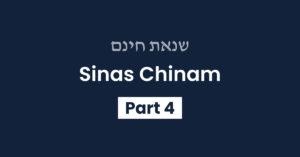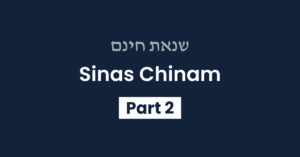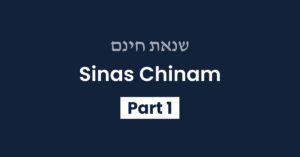So far, we have discussed 2 ways to avoid Sinas Chinam: (1) Firstly, we can focus on the fact that every Jew is here for the same purpose – to serve Hashem. (2) Secondly, we can develop our bitachon to remember that no one can take anything away from me. I’ll be less jealous of other people if I remember that Hashem gives me everything I need. If I don’t have something, it means I don’t need it for my unique role in this world.
This week, let’s focus on a third remedy for Sinas Chinam: Dan L’Kaf Zchus – judging favorably.
This week, let’s focus on a third remedy for Sinas Chinam: Dan L’Kaf Zchus – judging favorably.
Imagine you are davening Mincha in shul and notice one of your fellow daveners reach into his pocket and pull out his cell phone, in the middle of Shemoneh Esrei. He glances at his phone, then briskly walks out of shul to answer the call. Watching his actions, your eyes narrow critically and you think to yourself, “I can’t believe he answered his phone in the middle of Shemoneh Esrei! Doesn’t he know that you can’t interrupt Shemonah Esrei to take a phone call?!”
Although it may seem like this man is doing something wrong, the Torah requires us to view his actions in a positive light.*1 This is the mitzvah of “Dan L’Kaf Zchus” – judging others favorably.
Although it may seem like this man is doing something wrong, the Torah requires us to view his actions in a positive light.
For example, in the above case, you could try to think of a reason why the man answered his phone. Maybe he’s an EMT and just got an emergency call requiring him to go save someone’s life. Or maybe he is a baal teahuva, new to Yiddishkeit, and no one has taught him yet about the prohibition of interrupting Shemoneh Esrei to take a phone call.
When we judge others favorably, we are not only fulfilling a mitzvah in the Torah, but we are also laying the groundwork for feelings of peace, love, and friendship between us and our fellow Jews.2 The more we look at others with a critical eye, the more we feel Sinas Chinam. But if we strive to view people’s actions in a positive light, we will feel more happy and at peace with our fellow Jews. Indeed, the Pele Yo’eitz3 says that one of the best ways to avoid sinas chinam is to work on judging others favorably.
When Someone Hurts You Personally
It’s one thing to judge favorably when it looks like someone sinned Bein Adam LaMakom (between him and Hashem). But it’s much harder to judge favorably when we ourselves feel personally hurt by someone’s words or actions.
Imagine that you arrange to visit your friend on Shabbos afternoon at 4:00. You are so excited to tell your friend all about what a crazy week you had, and also ask her opinion about a dilemma you’ve been grappling with in your personal life. It’s swelteringly hot on Shabbos afternoon, but you walk over anyway. At 4:00 on the dot, you knock on her door. No answer. You knock again…. No answer. The sun is beating down on your neck but you wait. And wait. And knock. And wait. Finally, after 15 minutes of waiting, you turn around and go home. You feel so hurt inside. “How could she forget that we agreed to get together?” you fume. “Doesn’t she care about our friendship at all?!”
On Motzai Shabbos, you eagerly wait for her to call to apologize. But she doesn’t call. You consider calling her first, but you are too hurt to even speak. “She must not care that much about our friendship,” you conclude. “She’s not worth keeping as a friend.”
If we think along these lines, we are falling into the trap of jumping to conclusions. We are assuming that our friend doesn’t care about our friendship, but that might not necessarily be the case. Before we jump to conclusions, we have to remember that sometimes the reality is very different from how it seems.
Before we jump to conclusions, we have to remember that sometimes the reality is very different from how it seems.
Imagine that you calmly take a step back and a deep breath and think to yourself. “Wait a minute. I know in general my friend does care about me, and it doesn’t fit the picture that she would totally forget about my visit. Let me try to understand what happened.”
You pick up the phone and call your friend. Before you can even get a word out, her enthusiastic voice fills the line. “Hi! I’m SO glad you called!” she says. “I’m SO sorry I didn’t get to see you on Shabbos. My grandfather was rushed to the hospital on Friday afternoon and I had to drop everything to rush over and spend Shabbos in the hospital. I threw all my stuff into a bag and forgot to bring my phone. I would have called you earlier to let you know, but I only just got back from the hospital 20 minutes ago.”
You are shocked. Wow! You had no idea all of that was going on. Good thing your friend had a chance to explain herself before hearing all the angry thoughts that had been going around in your head for hours!
It doesn’t always happen that you find out that you interpreted events inaccurately. It might be that your friend really did just forget about your visit. Or maybe she took a nap and overslept. But if you talk to your friend about it calmly, and give them a chance to explain, they just might say something to make you feel better. They might apologize for what they did, or they might add details to the picture which you didn’t take into account.
When we approach our friends calmly and avoid jumping to conclusions, it helps us avoid unnecessary hatred in our hearts.
It’s easy to understand the importance of communication if we remember times when we were on the other side of the equation. Was there ever a time when someone got mad at you, and you felt it was unjustified? You were desperate for a chance to explain yourself, but the other person just wasn’t open to hearing it? Just as we wish other people would give us the chance to explain ourselves, we, too, should give others the benefit of the doubt and be open to hearing the other side of the story.
We, too, should give others the benefit of the doubt and be open to hearing the other side of the story.
An Added Bonus: Get Ready for Rosh HashanaANA
Not only does judging favorably help prevent Sinas Chinam, but it actually has another powerful benefit that is crucial for this time of year.
We are now approaching the month of Elul and the subsequent days of Rosh Hashana and Yom Kippur. How can we make sure that Hashem will pass a favorable judgement on us and grant us a good year?
Chazal reveal to us this secret: Hashem deals with us Middah Kineged Middah.4 If we are kind to other people, Hashem will be kind to us, too. If we view other people positively, Hashem will view us in a positive light, too. If we judge people favorably, Hashem will judge us favorably, too!5
If we judge people favorably, Hashem will judge us favorably, too!
Therefore, this time of year is a fantastic time to strengthen our “Dan L’Kaf Zchus muscles” and retrain our minds to see other people in a positive light. By strengthening the middah of Dan L’Kaf Zchus at this time, we will be more likely to receive a favorable judgement from Hashem on Rosh Hashana and Yom Kippur.
This week, let’s practice judging other people favorably and being open to interpreting their actions in a positive light. The more we judge others favorably, the less likely we will fall into the trap of Sinas Chinam, and the more Hashem will judge us favorably, as well.
| * NOTE: Halachah does not require us to judge every person favorably, all the time. The halachah depends upon the type of person and the type of situation. But generally, when you see a regular person doing something wrong, it is usually best to judge them favorably. |
Sources: [1] Sefer HaChinuch: Mitzvah 217 and Rabbeinu Yonah on Pirkei Avos 1:6; [2] Sefer HaChinuch ibid.; also Rashi on Shabbos 127b; [3] Pele Yo’eitz: Ahavas Re’im; [4] Sotah 8b; also see Ramban on Shemos 3:13 and Daas Torah Devarim I. pg. 93; [5] Shabbos 127b
Your Challenge
Once a day, practice judging other people favorably.
Either:
- If you see someone doing something wrong, try to think of a way to judge them favorably.
- If someone hurt your personally, try to understand why they did it and how their intentions might not be as bad as you had assumed.
- If you didn’t notice anyone doing a wrong today, you can try to judge someone favorably for something they did in the PAST.
Torah Questions
- Which 3 Hebrew words in the Torah teach us the commandment to judge other people favorably? (See Rashi on Vayikra 19:15)
- According to Pirkei Avos 2:4, you should never judge a person until ____?
- According to Pirkei Avos 2:11, hatred is one of 3 things that remove a person from this world. What are the other 2 things mentioned in THIS Mishna?
- What does the Torah command us to do for the donkey of someone whom we hate? (See Shemos 23:5)
- In Tehillim 139, Dovid HaMelech says that he hates…. whom?
- The Midrash (Bereishis Rabbah Vayeira 55:8) says that both love and hatred cause people to do strange things. What example does the Midrash bring of someone whose tremendous love caused him to do something strange? (See Bereishis 22 or Bereishis 46)
- What example does the Midrash bring of someone whose tremendous hatred caused him to do something strange? (See Shemos 14 or Bamidbar 22)
- About which two people is it said, “He loved him with the love of his soul” (Shmuel I 20:17)?
Questions to Ponder
- Is it ever OK to hate another person?
- What should you do if someone hurts you and they refuse to apologize?
- What should you do if you hate another person and you try to get rid of the hatred but it just doesn’t go away? Did that ever happen to you?
- Sinas Chinam is literally translated as “baseless hatred” or “hatred for no reason.” But if you feel you have a good reason for hating someone, why is this considered “baseless hatred”?
- Rav Dessler writes that someone who hates another person actually begins to see things that don’t exist. What do you think Rav Dessler means by this? What do you think this has to do with being Dan L’Kaf Zchus (judging favorably)?
- Rashi on Bamidbar 11:35 says that anyone who hates the Jewish people also hates Hashem. Why is this the case? Why isn’t it possible to love Hashem while hating the Jewish people?





